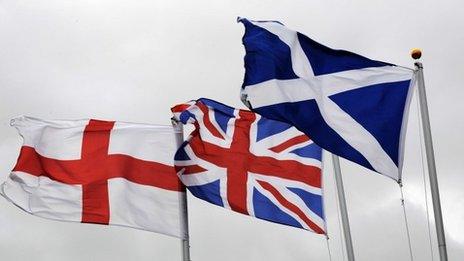English votes plan 'act of vandalism' warns Miliband
- Published
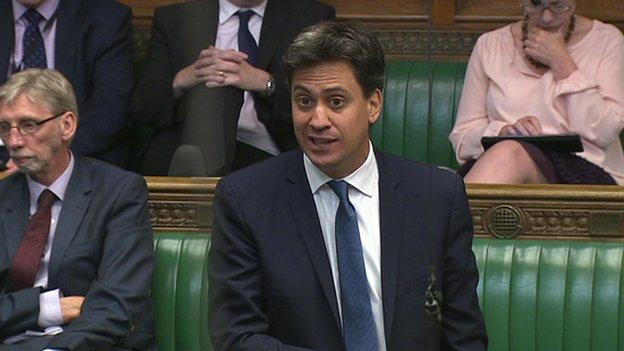
Plans for "English votes for English laws" are an "act of constitutional vandalism", Ed Miliband has warned.
In a Commons debate, the ex-Labour leader said Conservative plans to limit the voting powers of Scottish MPs on Commons laws would "rip up" hundreds of years of parliamentary procedure.
The SNP said the Conservatives wanted to create a "quasi-English Parliament".
But ministers said it was vital England was treated fairly as further powers were devolved to other parts of the UK.
At the end of the debate, Labour staged and won a vote in which the government abstained. And Conservative MP David Davis raised a point of order to urge the government to allow more time for the matter to be considered.
The government believes bills applying exclusively to England should not become law without the explicit consent of MPs from English constituencies and it wants to change Commons rules known as standing orders to give them a "decisive say" during their passage.
Ministers say this will address the longstanding anomaly by which Scottish MPs can vote on issues such as health and education affecting England but English MPs have no say on similar matters relating to Scotland, where such policies are devolved.

Analysis
Mark D'Arcy, BBC Parliamentary correspondent
Panic stations? From the point of view of the government whips this afternoon's emergency Commons debate on English Votes for English Laws was really rather alarming.
The debate, so skilfully secured by Lib Dem ex Scottish secretary Alistair Carmichael, produced a slightly pointless vote in which the Conservatives mostly abstained, but it brought all kinds of nasty tensions to the surface.
Conservative MPs are supposed to be signed up for EVEL under the terms of their manifesto, but there were clearly quite a few with doubts, some about the policy, many more about the process, which was Mr Carmichael's line of attack.

However, the plans came under sustained attack from Labour, SNP and Lib Dems in an urgent debate, secured by former Scottish Secretary Alistair Carmichael.
MPs are due to debate and vote on the government's plans next week but Mr Carmichael, the MP for Orkney and Shetland, said the plans required more detailed consideration, arguably through primary legislation.
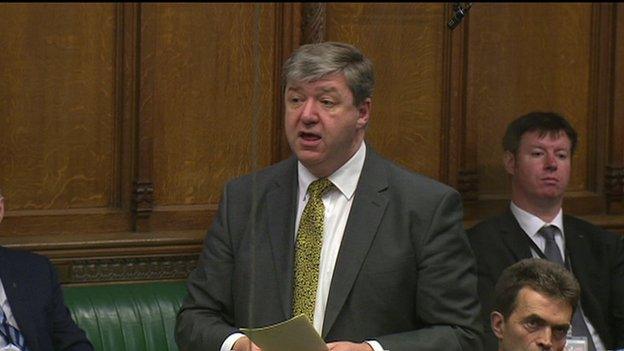
Mr Carmichael said the proposed change would call into question the UK Parliament's sovereignty
If MPs representing constituencies in England had a "veto" on certain legislation, it would breach the longstanding principle that MPs, no matter who they represented, were "all equal".
"To go as far as the government wants to go in the timescale they want to go brings with it an attendant level of risk that I would consider to be irresponsible," he said.
"They are not entitled to use the UK Parliament as a proxy for an English Parliament."
Manifesto pledge
Assurances that the new system would be reviewed by MPs after a year were inadequate, he added, saying this would not be capable of "putting a dangerous genie back in the bottle after it had been let out - we all know that is the political reality".
But Commons Leader Chris Grayling said it was "simply incorrect" to claim some MPs would be prevented from debating and voting on certain legislation and would continue to exercise the same rights as they do now.
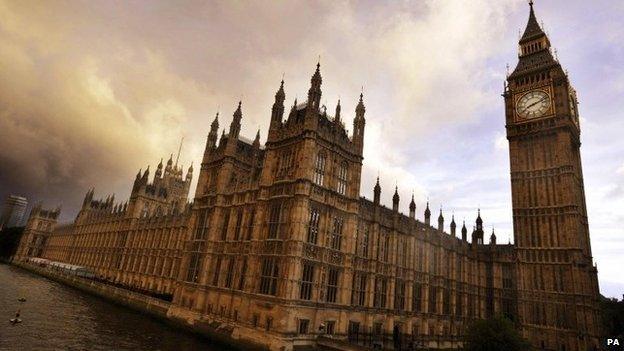
The government is giving English MPs a veto over some legislation
Pressed by Mr Miliband on "what the meaning and definition" of English-only legislation would be, Mr Grayling said it would be up to the Speaker to decide but he believed a "simple test" would be what things were devolved to Scotland.
Requiring bills to have the support of a "double majority" of the whole of the Commons and those MPs representing England would also help mitigate "any resentment" felt by English voters about the slower pace of devolution to England.
"It is of vital importance that English citizens of the UK, as we move to an extra layer of devolution to Scotland and Wales and devolve additional tax powers to Northern Ireland, that they think it is fair," he said.
"It is what we pledged to do in our manifesto. We set it out in detail, step by step by step. We are implementing these changes and keeping our promises. I think the people who elected us would expect nothing else."
'Scottish tattoos'
Mr Miliband said the Conservatives had the power to address the issue after winning the election but urged them to think again.
"Is this true to the traditions of Conservatism? No because the last thing you do is rip up hundreds of years of constitutional practice in a standing order vote just before the House goes into recess," he said.
"Doing this procedure in the way it is being proposed is an act of constitutional vandalism. It really is."
The SNP said Scottish voters would be affected by legislation on schools and NHS budgets in England through the Barnett Formula used to allocate public spending to different nations of the UK.
"This not just English votes for English laws, this is English votes for Scottish laws," said Pete Wishart, MP for Perth and North Perthshire. "It is totally and utterly unacceptable."
He added: "Why don't they just tattoo our foreheads 'Scottish' and then they would be able to identify us."
And Conservative MP Sir Edward Leigh said the move would not make any difference to the outcome of votes and urged ministers to omit laws which indirectly applied to Scotland, saying not to do so would be a "gift" to the SNP's independence campaign.
Responding to a question by an SNP MP on Monday, Mr Grayling said the only English-only measure during the last Parliament had been the Education Bill, and there were 13 Bills which applied to England and Wales.
- Published2 July 2015
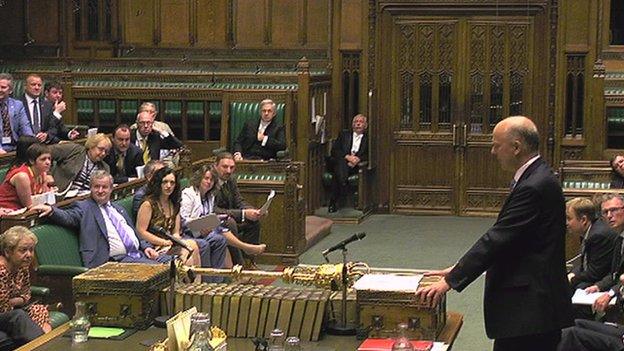
- Published12 July 2021
